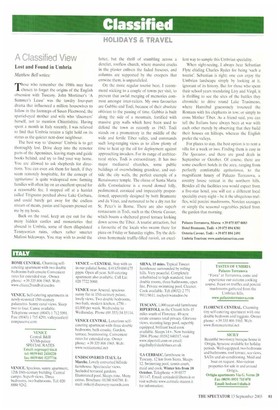A Classified View
Lost and Found in Umbria
Matthew Bell writes:
Whose who remember the 1980s may have 1 chosen to forget the origins of the English obsession with Tuscany. John Mortimer's 'A Summer's Lease' was the tawdry four-part drama that influenced a million housewives to follow in the footsteps of Susan Fleetwood. the spaniel-eyed mother and wife who 'discovers' herself, not to mention Chiantishire. Having spent a month in Italy recently, I was relieved to find that Umbria retains a tight hold on its status as the quieter next-door neighbour.
The best way to 'discover' Umbria is to get thoroughly lost. Drive deep into the remoter parts of the Apennines, leaving maps and guide hooks behind, and try to find your way home. You are allowed to ask shepherds for directions. You can even ask them for lunch, if they seem remotely hospitable, for the concept of 'agriturismo. is quite widespread now: farming families will often lay on an excellent spread for a reasonable fee. I stopped off at a hamlet called Titignano perched above Lake Corbara, and could barely get away for the endless stream of meats, pastas and liqueurs pressed on me by my hosts.
Back on the road, keep an eye out for the many hidden castles and monasteries that abound in Umbria, some of them dilapidated Tennysonian ruins, others rather smarter Mafiosi hideaways. You may wish to avoid the latter, but the thrill of stumbling across a derelict, roofless church, where massive cracks in the plaster enliven the faded frescoes, and columns are supported by the creepers that entwine them, is unparalleled.
On the more regular tourist beat. I recommend sticking to a couple of towns per visit, to prevent that awful merging of memories common amongst inter-railers. My own favourites are Gubbio and Todi, because of their absolute oblivion to the passing of time. Gubbio is built alone the side of a mountain, fortified with massive grey walls which have been used to defend the town as recently as 1943. Todi stands on a promontory in the middle of the wide and fertile Tiber valley, and commands such long-ranging views as to allow plenty of time to heat up the oil for deployment against approaching invaders. For its range of architectural styles. Todi is extraordinary. It has two major mediaeval churches, some public buildings of overwhelming grandeur, and outside the city walls, the perfect example of a Renaissance temple. The chiesa of Santa Maria della Consolazione is a round domed folly, pedimented, corniced and impeccably proportioned, apparently designed by both Bramante and da Vinci, and rumoured to be a dry run for St. Peter's in Rome. There are also superb restaurants in Todi, such as the Osteria Cavour, which boasts a sheltered gravel terrace looking down across the Tiber. A tourist attraction, but a favourite of the locals who swarm there for pizza on Friday or Saturday nights. Try the delicious homemade truffle-filled ravioli, an excel
lent way to sample this Umbrian speciality.
When sight-seeing, I always hear Sebastian Flyte chiding Charles Ryder for being 'such a tourist'. Sebastian is right; one can enjoy the Umbrian landscape simply hy looking at it, ignorant of its history. But for those who spent their school years translating Livy and Virgil, it is thrilling to see the sites of the battles they chronicle: to drive round Lake Trasimeno, where Hannibal gruesomely trounced the Romans with his elephants in tow; or simply to cross Mother Tiber. As a friend said, you can tell the Italians have always been at war with each other merely by observing that they build their houses on hilltops, whereas the English prefer the valleys.
For places to stay, the best option is to rent a villa for a week or two. Finding them is easy in The Spectator, and there are good deals in September or October. Of course. there are some excellent hotels in the area, ranging from perfectly comfortable agriturismos, to the magnificent luxury of Palazzo Terranova, a country house retreat in the northern hills, Besides all the facilities you would expect from a five-star hotel, you will eat a different local speciality every night be it the ubiquitous truffles, wild porcini mushrooms, Norcian sausages or simply the seasonal vegetables picked from the garden that morning.
Palazzo Terranova, Morra: +39 075 Hotel Bramante, Todi: +39 075 894 Osteria Catour. Todi : +39 075 894 Umbria Tourism: www.umbriatourism.com


























































































 Previous page
Previous page